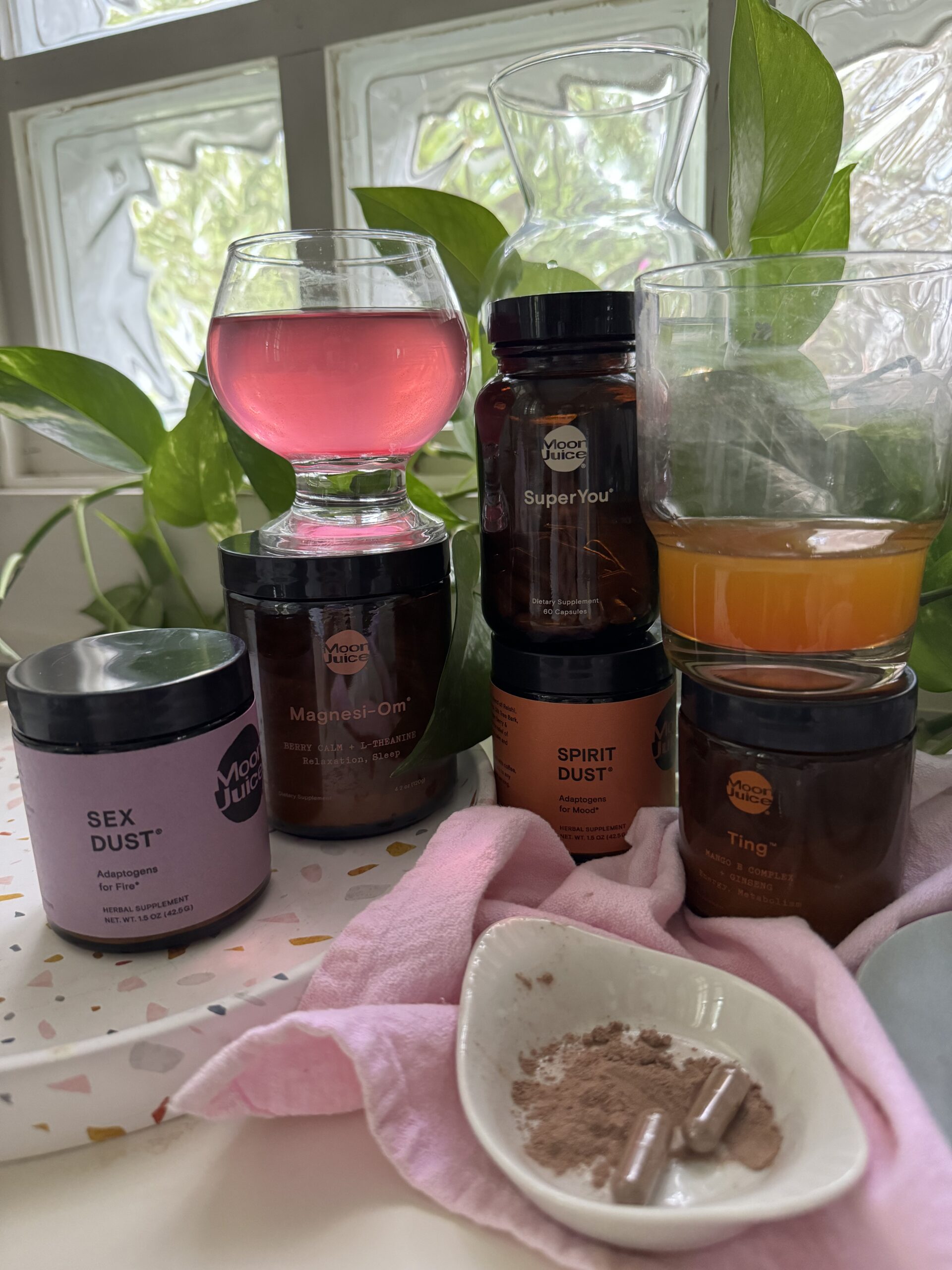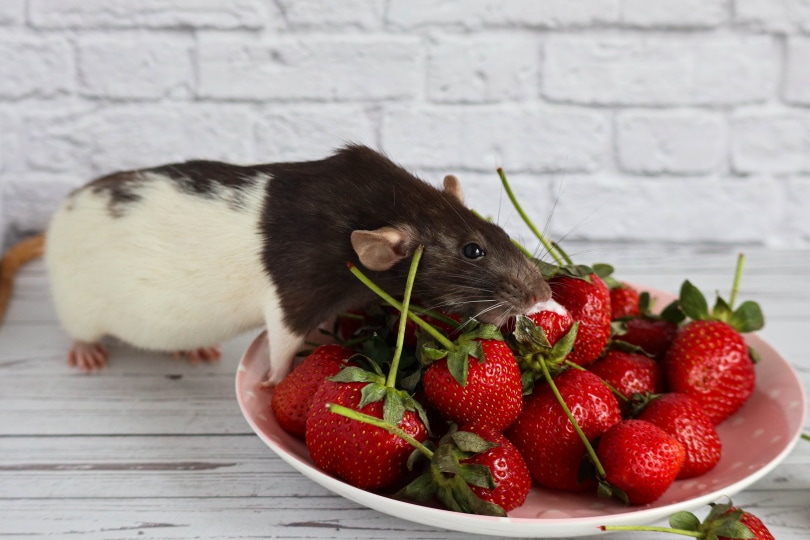

You may think of them as pests, but rats actually make lovely pets. Rats are smart, friendly, and easy to care for. Furthermore, there is a wide variety to choose from. Commonly, pet rats are one of seven different varieties of fancy rats. While these seven types of rats differ in looks, one thing that’s consistent among them is their diet.
All rats are omnivores. This means they eat a varied diet of both plant and animal foods. And if you’re a fan of fruit, the good news is that it’s fine to share your strawberries and most other fresh fruits with your pet rat. Keep reading to learn more about what rats eat in the wild and in captivity.

The Wild Rat Diet
Rats are opportunistic eaters. If a rat lives in the forest, it will eat vegetation, fruit, and seeds. If a rat lives in a city or near humans, it’s more likely to feast on garbage, discarded human food, or anything else they can find. The diet of a wild rat is never a cookie-cutter menu as it so heavily depends on the environment these rodents live in.
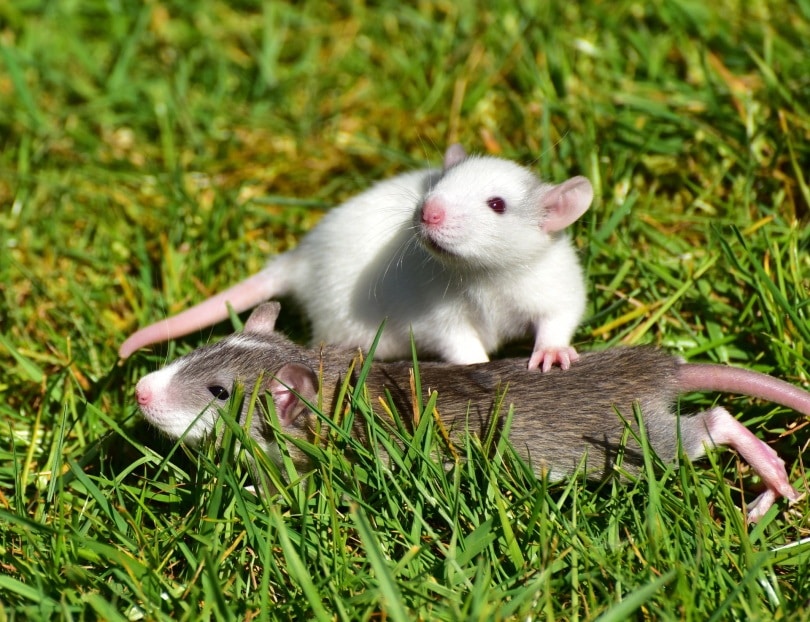
Rats in Captivity
Pet rats are a little more discerning in their food choices. That’s not to say they wouldn’t eat trash if other food was scarce. However, to keep a pet rat in peak health, you should be cognizant of what the proper rat diet includes.
Veterinarians recommend a pet rat’s diet contain:
- Pellets made specifically for rats
- Fresh fruit
- Vegetables
- Occasional seeds
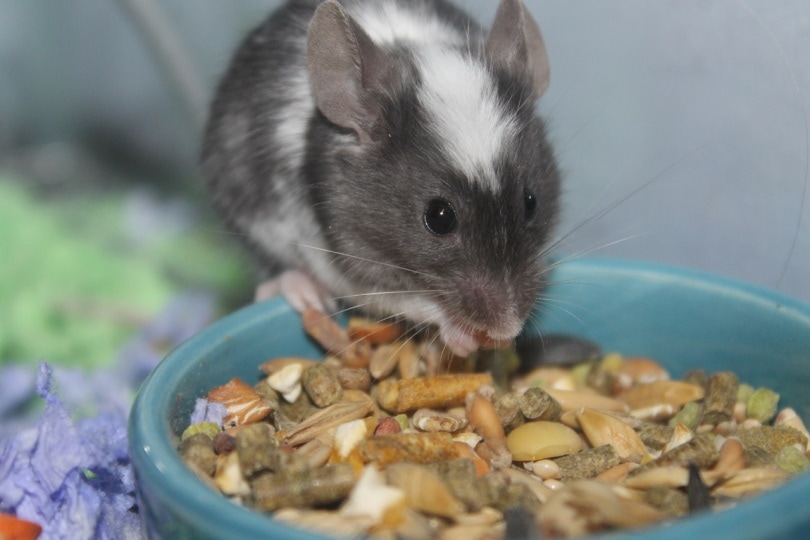
The pellets should be a majority of the diet with fruits and veggies filling in the rest.
Rats and Strawberries
So where do strawberries fit in? In the wild, rats eat fruits and berries, so it’s no surprise pet rats would like them too. They’ll happily nibble on bites of strawberry if you provide them as an occasional treat.
How to Prepare Strawberries for Your Rat
If you’re going to give your pet rat strawberries, make sure that you cut the berries into small pieces. This will prevent choking or other trouble with chewing the strawberries. Make sure you clean the berries carefully to remove any contaminants or pesticides. You can also remove the leaves from the top of the strawberries.
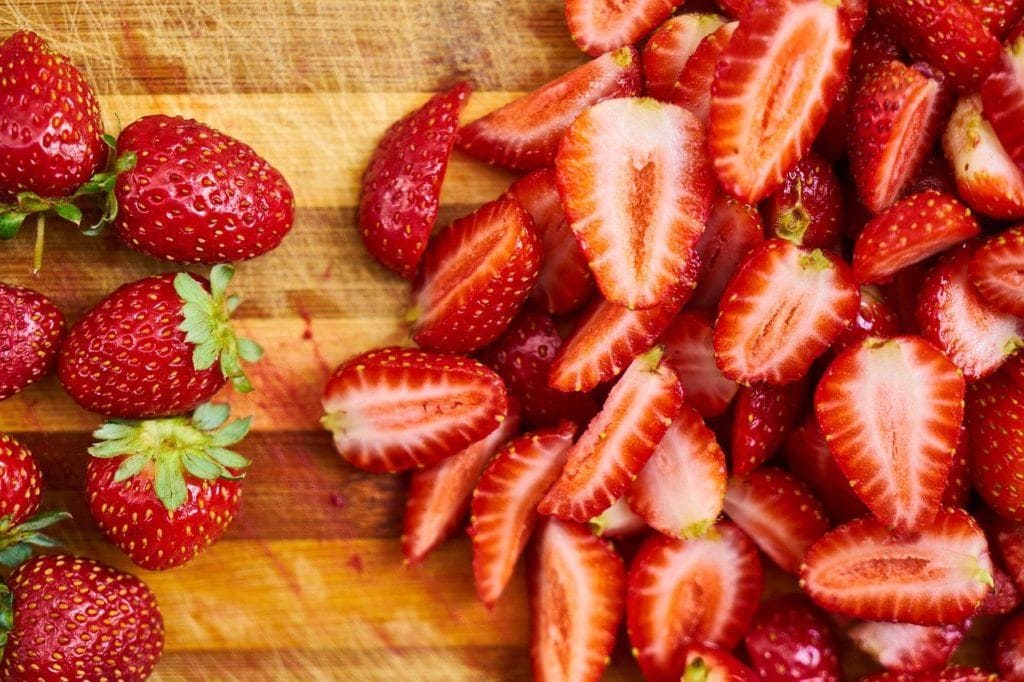
Benefits of Strawberries for Rats
Strawberries are a healthy treat. They contain many vitamins such as C, B, and K. They are also an excellent source of magnesium, fiber, and potassium. Strawberries are low in calories as well, so an occasional berry won’t cause your rat to gain weight.
Other Healthy Fruits and Veggie for Rats
Strawberries are just one of many fruits and veggies you can safely feed your pet rat. Some fruit favorites include:
- Apples
- Bananas
- Blueberries
- Cantaloupe
- Cherries (remove the pit)
- Grapes (seedless)
- Papaya
- Peaches
- Pears
- Plums
- Raspberries
- Watermelon
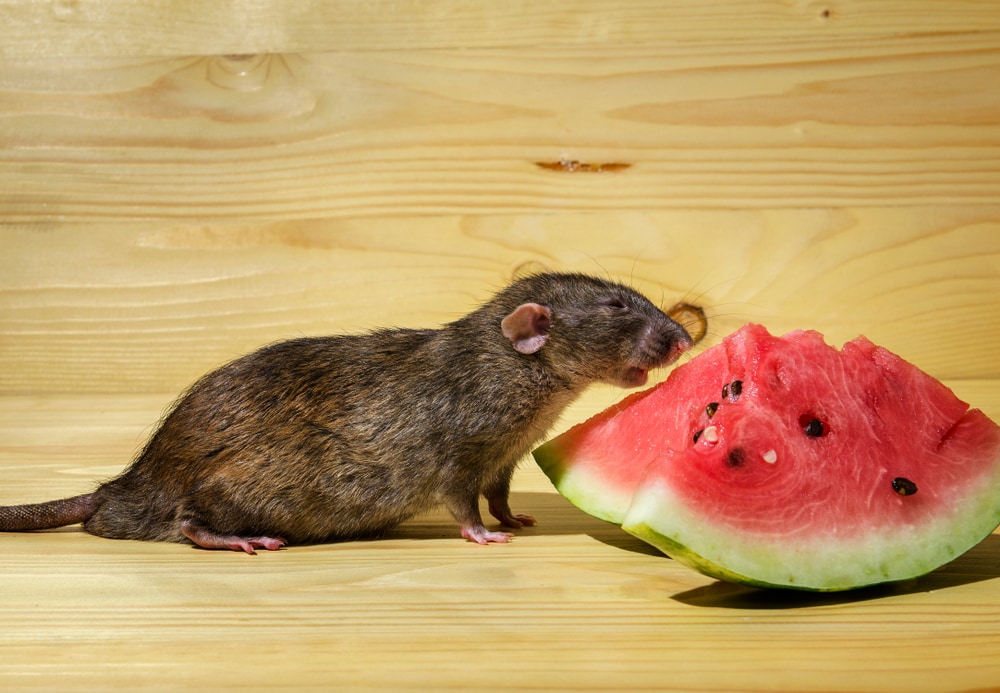
Just like with strawberries, any other fruits should be cut into small, manageable pieces. You should also remove seeds or pits from things like apples, pears, and peaches.
Vegetables are also a wonderful snack choice for pet rats. Some of the best veggie options include:
- Broccoli
- Carrots
- Cauliflower
- Celery
- Cucumber
- Green peppers
- Kale
- Lettuce
- Peas
- Potatoes
- Squash
- Sweet potatoes
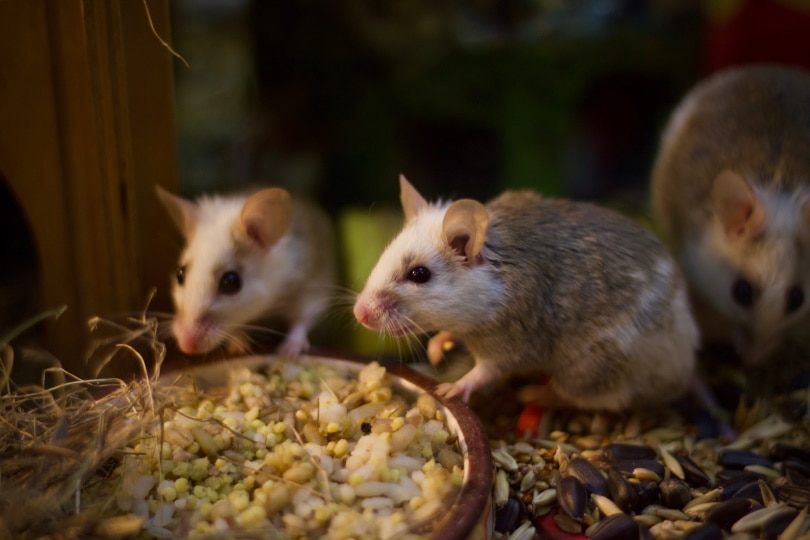
Any tough veggies, like carrots, potatoes, sweet potatoes, and squash, should be steamed and peeled before being fed to your rat. This makes them easier for them to eat.
Foods You Should Never Give Your Rat
There are quite a few foods you should never feed your pet rat. Just because they’ll eat a little of everything in the wild doesn’t mean it’s good for their health. You want your pet rat to be in good health so don’t feed them the following:
- Uncooked beans – These can be hazardous for rats as they contain compounds that destroy vitamin A and protein digestion enzymes.
- Blue cheese – Rats and cheese aren’t always a good mix, especially rats and blue cheese. The mold in blue cheese is toxic for rats.
- Carbonated or caffeinated beverages – You should never give rats carbonated drinks as they are high in sugar and the carbonation can be harmful. Caffeine is also bad for rats.
- Chocolate – Like many pets, rats shouldn’t have chocolate.
- Green potatoes – Green potatoes are toxic for rats.
- Onions – Onions can cause stomach problems in rats.
- Citrus fruits – While it might be fine to give female rats some citrus fruits, they can cause cancer in male rats. It’s best not to give any rats citrus.
- Rhubarb – Rhubarb is toxic to rats.
- Processed foods – Processed snacks are typically high in sugar, fat, and calories. They’re not good for you and certainly not good for your rat.
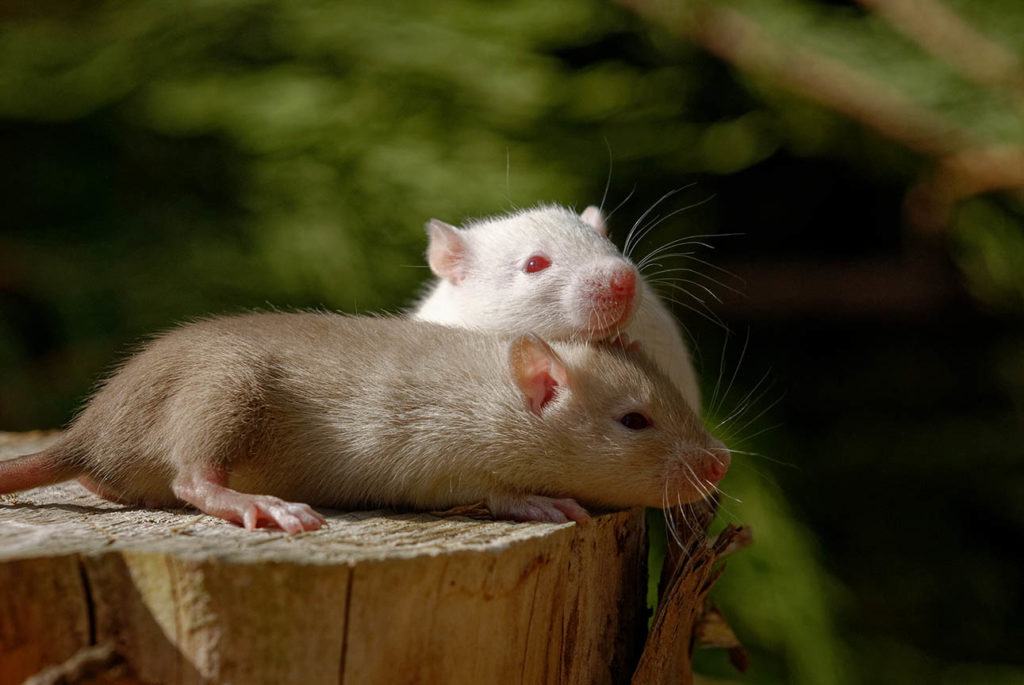

Final Thoughts
Rats are excellent pets that require the same care in feeding as any other animal does. They have specific dietary needs that should be met to ensure optimal health.
Strawberries are just one of many fresh fruits and vegetables that can be included in the ideal rat diet.
Featured Image Credit: Grace800, Shutterstock

Nicole is the proud mom of Baby, a Burmese cat and Rosa, a New Zealand Huntaway. A Canadian expat, Nicole now lives on a lush forest property with her Kiwi husband in New Zealand. She has a strong love for all animals of all shapes and sizes (and particularly loves a good interspecies friendship) and wants to share her animal knowledge and other experts’ knowledge with pet lovers across the globe.




